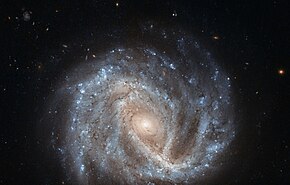NGC 2441 is a barred spiral galaxy located in the northern constellation of Camelopardalis.[2] Its velocity with respect to the cosmic microwave background is 3492 ± 2 km/s, which corresponds to a Hubble distance of 168.0 ± 11.8 Mly (51.51 ± 3.61 Mpc).[3] In addition, 16 non-redshift measurements give a distance of 176.16 ± 16.80 Mly (54.012 ± 5.151 Mpc).[4] The galaxy was discovered by German astronomer Wilhelm Tempel on 8 August 1882.[5]
| NGC 2441 | |
|---|---|
 NGC 2441 imaged by the Hubble Space Telescope | |
| Observation data (J2000 epoch) | |
| Constellation | Camelopardalis |
| Right ascension | 07h 51m 54.772s [1] |
| Declination | +73° 00′ 56.42″[1] |
| Redshift | 0.01157[1] |
| Heliocentric radial velocity | 3450 km/s[1] |
| Distance | 180 million ly[2] |
| Group or cluster | NGC 2523 Group |
| Apparent magnitude (B) | 12.7[1] |
| Characteristics | |
| Type | SBc[1] |
| Size | ~117,900 ly (36.14 kpc) (estimated)[3] |
| Apparent size (V) | 2.633 x 1.159 arcmin[1] |
| Other designations | |
| IRAS 07460+7308, 2MASX J07515477+7300564, UGC 4036, MCG +12-08-015, PGC 22031, CGCG 331-017 | |
According to A.M. Garcia, NGC 2441 is a member of the NGC 2523 galaxy group (also known as LGG 154).[6] This group contains five galaxies, including NGC 2523, NGC 2550A, UGC 4041, and UGC 4199.
One supernova has been observed in NGC 2441. SN1995E (type Ia, mag. 15)[7] was discovered by Alessandro Gabrielcic on 20 February 1995, and observations suggested it may display a light echo, where light from the supernova is reflected from matter along our line of sight, making it appear to "echo" outwards from the source.[2]
Image gallery
edit-
In this Hubble Space Telescope image of NGC 2441, supernova SN1995E is the white spot within the red circle.
See also
editReferences
edit- ^ a b c d e f g "Search Results for NGC 2441". simbad.u-strasbg.fr/simbad/. SIMBAD. Retrieved 25 June 2014.
- ^ a b c "A curious supernova in NGC 2441". ESA/Hubble Picture of the Week. ESA/Hubble. Retrieved 25 June 2014.
- ^ a b "Results for object NGC 2441". NASA/IPAC Extragalactic Database. NASA and Caltech. Retrieved 17 November 2024.
- ^ "Distance Results for NGC 2441". NASA/IPAC EXTRAGALACTIC DATABASE. NASA. Retrieved 17 November 2024.
- ^ Seligman, Courtney. "NGC 2441". Celestial Atlas. Retrieved 17 November 2024.
- ^ Garcia, A. M. (1993). "General study of group membership. II. Determination of nearby groups". Astronomy and Astrophysics Supplement Series. 100: 47. Bibcode:1993A&AS..100...47G.
- ^ "SN SN1995E". Transient Name Server. IAU. Retrieved 17 November 2024.
External links
edit- Media related to NGC 2441 at Wikimedia Commons